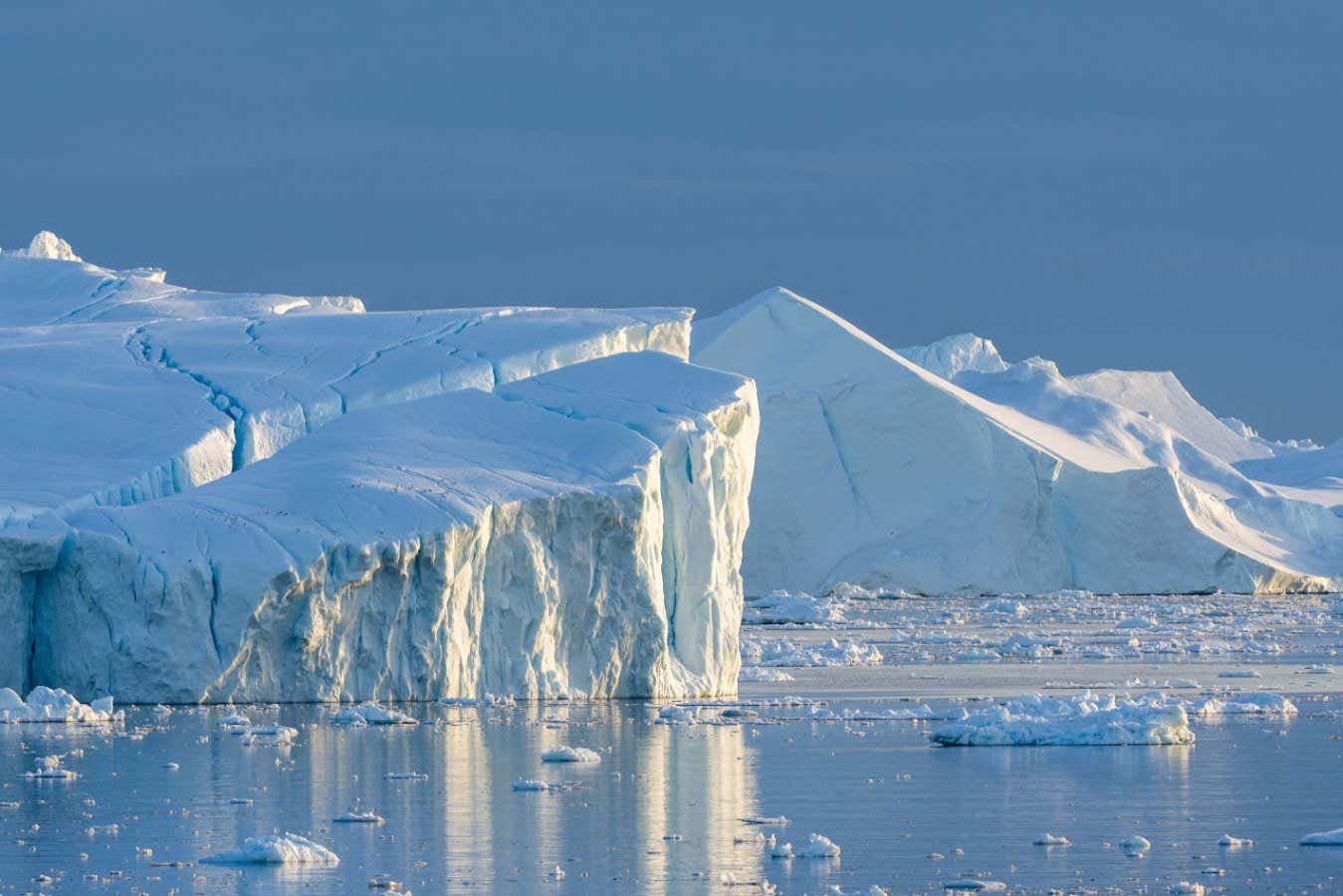Can we slow the melting of the ice caps?
Ulrik Pedersen/NurPhoto/Shutterstock
With carbon dioxide emissions still increasing, can geoengineering halt the melting of the Greenland and Antarctic ice caps and prevent massive sea level rises? No, according to a review of the five main ideas for polar geoengineering proposed so far.
Promoting geoengineering ideas that cannot work distracts attention from the key issue, says Martin Siegert at the University of Exeter in the UK. “It becomes something that is working against what we need to do, which is to decarbonise.”
Siegert and his colleagues assessed each polar geoengineering idea based on six criteria: will it work, can it be done at the scale required in a reasonable time, is it affordable, will countries agree to it and be able to maintain that agreement for many decades, what are the environmental risks and will it raise false hopes?
In Antarctica, some ice sheets rest on the seabed and are being melted from below by warming ocean waters. One proposed idea to save them is to build immense “curtains” to stop warm currents from reaching these ice sheets and the floating ice shelves that help protect them.
It is not clear if this would help, says team member Steven Chown at Monash University in Australia.
“Warm water may well be diverted from one ice shelf, but the question is where does it go to? It may well just go to the ice shelf next door, creating a different problem,” he says.
Such curtains would have to be anchored to the seafloor at depths of up to 1 kilometre, extend upwards for hundreds of metres and stretch for tens of kilometres at least – and they would have to be built in an extremely challenging environment, says Chown.
Half of research cruises to Antarctica get diverted from their planned courses because of the dangers of icebergs and sea ice. “It’s just too dangerous,” he says.
Only one ship has ever managed to reach the area where a sea curtain would need to be constructed to protect the Thwaites “doomsday” glacier, Chown adds.
With glaciers that sit on land rather than the seabed, the worry is warming temperatures are resulting in more liquid water underneath the ice, which acts as a lubricant that speeds up the ice flow. More ice reaching the sea means more sea level rise.
So one proposal is to drill holes down through the ice to pump out all the water underneath them.
“This would require a large amount of holes through extremely deep – possibly kilometres thick – areas of ice that’s far beyond any scientific drilling project that’s ever happened,” says Sammie Buzzard at Northumbria University in the UK.
We don’t even know where the water is and where to drill. “But even if we understood where to drill better, we still have the scalability problem, the cost problem, the problem of powering that drilling,” Buzzard says. “Even if we understood the science better, it still isn’t a feasible idea.”
Another idea is to cover the surface of the Arctic Ocean with tiny, hollow glass beads to reflect more of the sun’s heat back into space and cool the region. “[But] it may well have the opposite effect,” says Chown.
Maintaining this cover would require 360 megatonnes of glass beads to be produced each year, which is equivalent to the total global production of plastic. A project aiming to try the idea was shut down after lab tests showed the beads were toxic.
Then there is stratospheric aerosol injection – releasing substances such as sulphur dioxide into the stratosphere to form aerosols that reflect sunlight. This is much more problematic over the poles than elsewhere. Aerosols do not remain in the polar stratosphere for as long as over the tropics, say, and they make little difference during dark polar winters, or above reflective ice or snow.
So very large quantities of aerosols would be required. This could deplete the ozone layer and disrupt the climate elsewhere, says Valérie Masson-Delmotte at Paris-Saclay University in France. Countries that are adversely affected might demand compensation.
Some have suggested the idea of thickening the sea ice in the Arctic by pumping seawater on top of it. “This would require millions of devices deployed across drifting, fracturing ice,” says Heïdi Sevestre at the Arctic Monitoring and Assessment Programme in Norway. “This is technologically, logistically and financially unrealistic.”
The final idea the researchers assessed is fertilising the Southern Ocean to boost phytoplankton growth, which removes carbon if more organic matter is locked away in sediments on the seafloor. But across 12 small trials, more carbon reached the seafloor in only one. And this approach could accelerate oxygen loss in the oceans, potentially increasing the release of potent greenhouse gases such as methane and nitrous oxide, says Masson-Delmotte.
“I have been extremely concerned by discussions where some proponents of these approaches were over-enthusiastic and had a very simplistic [view] of the challenges,” says Masson-Delmotte. “I think this work addresses such gaps.”
Siegert thinks further research into these ideas is a waste of resources. “The impossibility of scale is something you can’t research out,” he says.
Not all researchers are convinced. “I don’t think enough is known about any of these approaches for them to be taken off the table,” says Shaun Fitzgerald at the Centre for Climate Repair in Cambridge, UK.
Topics:


